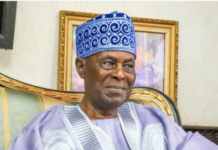By Gabriel Alabi
Ibrahim Maiwada, in this piece made available to National Association of Online Security Reporters, NAOSRE, examines the professionalism of FRSC under the quality leadership of Boboye Oyeyemi.
There is a general aphorism that the reward for doing a job so well is being set on the track of more work, and in pursuing that logic, it is about also being allowed to perfect all the good work such person has engaged in, to ultimately bringing these to fruition.
The wisdom of the foregoing appears apt in relation to the situation of the Corps Marshall and Chief Executive of the Federal Road Safety Commission (FRSC), Dr. Boboye Oyeyemi. This is within the purview of what appears as an orchestrated campaign of calumny targeted at railroading him out of office, while his tenure at the helms of Nigeria’s primary road management authority is yet to end.
While there has been a lot of bean-counting around civil service rules and the legal or moral basis of his continuation in office, despite having attained the stipulated age of retirement, the fact remains that service at the upper echelons of public administration in the country basically depends at the discretion of the chief executive of the federation – the President.
It is the President who largely considers how his vision and directives have been well served and executed by any particular helmsman and then decides on whether or not to keep such person at the duty post, as he seeks to maximise the effectiveness of public institutions, and deliver on the mandate given to him by the public.
Also, in a country in which the public space is charged with rhetoric about the promotion of a meritocracy, a tested and efficient cadre, appeals to our ‘better angels’ for public institutions to be run on the basis of excellence in human resource, and not to keep pandering to the pressures of ethnic, religious or other forms of quotas, it is not unthinkable for a President to want to stick to his ‘best eleven’ across the gamut of governance.
There is also some history behind this. A recall of such point to an instance during the administration of President Olusegun Obasanjo, who chose to keep one of the Inspectors General of Police that served under him, Sunday Ehindero, on beyond the demands of conventional retirement. In that regard, he had made a special concession and extension of years of service for Ehindero, to enable the Inspector General fully deliver on some of the security sector programmes of his government.
Currently, we also have the situation of the present service chiefs in the military apparatus, from the Army to the Navy and Air Force, who are staying on in office at the discretion of President Buhari, despite having reached their points of retirement from the forces. While many might not seem to understand the rationale behind keeping this gentlemen on at their duty posts, hence the ranging clamour for their replacement, yet it might not be far-fetched to consider that the Commander-In-Chief is possibly privy to a different level of information and intelligence – not likely to be easily available to the public – that informs his adopted stance.
Still, it remains a fact that Dr. Oyeyemi was duly reappointed for another four-year tenure in 2018, despite indications of almost having attained the age ceiling for service. This was an exercise of the discretion of the President, who appears to have been pleased with the work being carried out at the FRSC. Basically, the cadre of public officials that Dr. Oyeyemi belongs to serve at the pleasure of the President, whose disposition towards keeping them on the job could pertain to the critical roles that they play in sectors crucial to the safety of lives in the country.
There are testimonies that point out that Oyeyemi’s over three decades at the FRSC till date have been underscored by an unusual diligence to duty and relentless missioning after the objectives of the Commission. He is noted as being one of the foundational staff of the organisation, who rose through the ranks to arrive at its leadership; hence he is a true native of the system he administers. Having served in almost every department and formation of the FRSC, it is easy to see how he gained what has been described as the rounded reputation of a certified road traffic management administrator.
Its is public knowledge that on his watch at the FRSC, there has been a trending down of road accidents in the country, due to more campaigns around safe driving practices, wider monitoring of road use, and also a greater swiftness in the response to road accidents. These include both the emergency responses to preserving life by enabling prompt access to medical attention and the quick clearing of our local and major roads and highways, following unfortunate mishaps.
Oyeyemi is noted as having taken over command of the FRSC at a time when road traffic crashes in Nigeria were routine and so bad that they led to over 40,000 fatalities per year. This made the country rank second only to Ethiopia in terms of nations with the most dangerous roads to drive on.
Other testaments to the level of difference that Dr. Oyeyemi has made in Nigeria’s traffic management system highlight facts such as his introduction of policies, reforms and the digitisation process that have produced a sophisticated fleet system. These are observed to have been accomplished through the Road Transport Safety Standardisation Scheme that regulates and coordinates the fleet operation in the country.
Also, there have been the strengthening of the Driving School Standardisation Programme; the setting up of the “Safe to Load” programme, to reduce the rate of road accidents caused by articulated vehicles; and the rapid expansion of FRSC Commands through the creation of Outposts, several other Unit Commands, additional Drivers Licence Centres, and ambulance points.
Further to these, the inventory of achievements of Oyeyemi administration of the FRSC point to the introduction of speed-limiting devices for safer road use, the upgrading of the FRSC Academy to a degree awarding institution, and the establishment of an FRSC Traffic Radio for the better outreach of the Commission to the public on road safety.
The slew of vital programmes carried out under Dr. Oyeyemi as the Corps Marshall of the FRSC equally include the training of Federal Government drivers across the ministries, departments and agencies (MDAs) or government; the child restraint campaign; and the tyre campaign, which has sought to stem the influx and use of fake and expired tyres into the country.
More so, there has been the strengthening of inter-agency cooperation with relevant government institutions, such as the National Identity Management Commission (NIMC), the National Bureau of Statistics (NBS), Nigerian Customs Service (NCS), and banks, towards the harmonisation of data for national development.
The accomplishments that Dr. Oyeyemi have marshalled into road administration in Nigeria is observed as having served as a beacon in the continent till date, making the Sierra Leonean government send their road safety officials to understudy the success of the system in place in Nigeria, for adoption in their country.
With a doctorate degree in Transport Administration from the University of Nigeria, Nsukka; a Master’s degree in Public Administration (MPA) from the University of Lagos, and numerous certifications from institutions such as the Harvard University School of Government, and Royal Institute for Public Administration (RIPA), London, Dr. Oyeyemi appears certainly as well-heeled for the role he has been playing.
It is no surprise that through his direction, the FRSC has won a number of distinctions, such as best MDA in nation building, by means of the NITDA-NIHILENT e-Governance recognition in 2015, and the Award for Excellence in Humanitarian Service in Nigeria in 2015. More, so the Commission has granted the Service Delivery Award as one of the Outstanding Public Institutions in Nigeria by Independent Service Delivery monitoring Group (ISDMG), 2014-2015, among numerous other high profile recognitions that testify to the quality of its leadership.
Such a remarkable catalogue of accomplishments easily makes the case for the deepening of a particular form of painstaking leadership in the public sector and FRSC, which Dr. Oyeyemi represents. And, rather than the restless stoking of controversies around a duly renewed tenure, wouldn’t road management in the country and public service be better off if Oyeyemi is allowed to consolidate his achievements through the remainder of his time in office, and then pass a virile baton on to the next cohort of leadership?






